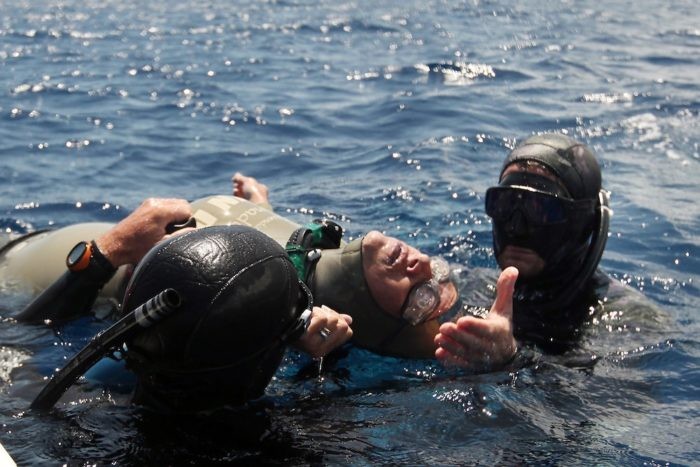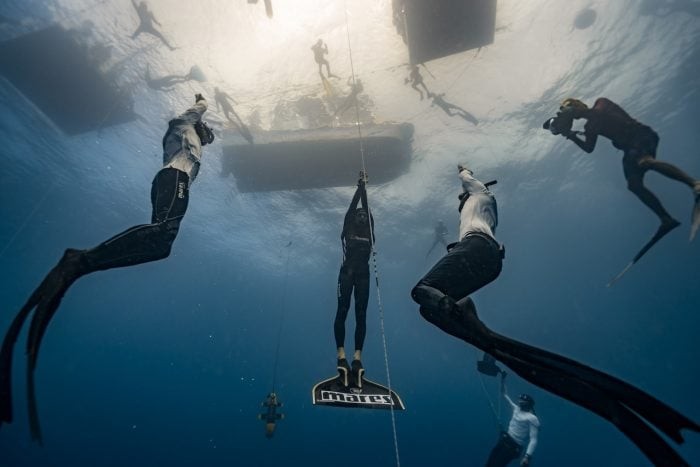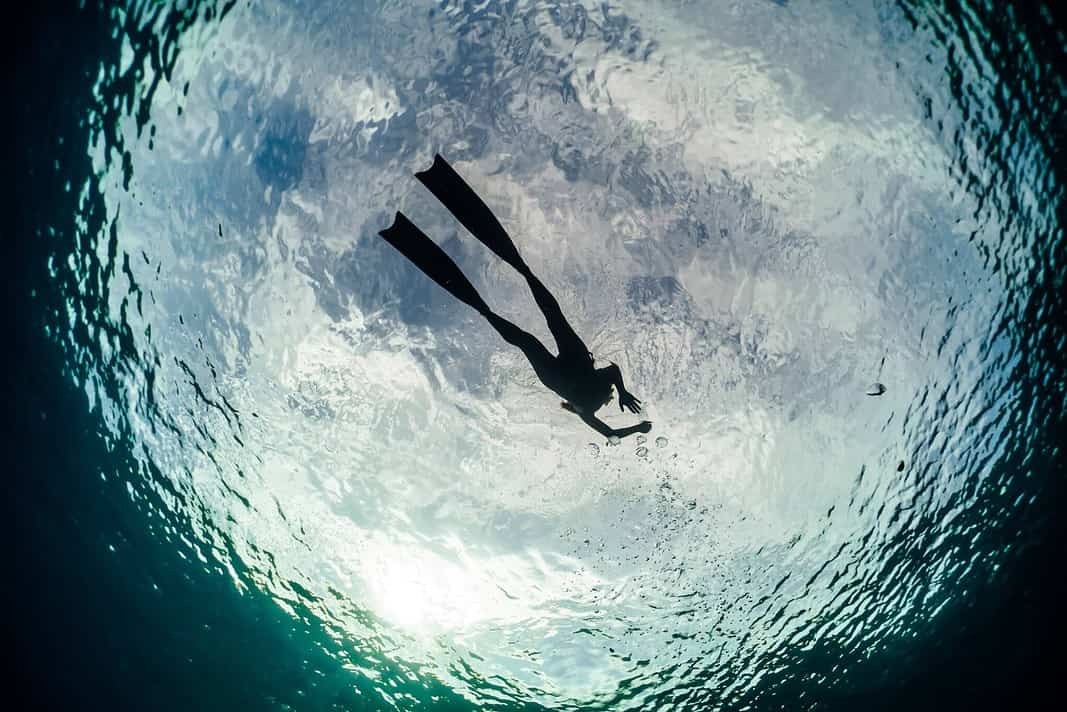Well – it’s happened. You were freediving and experienced an LMC, or worse, a blackout.
What now?
First, know that it’s not the end of the world. While experiencing an LMC or blacking out is something you want to avoid while freediving, if it happens once – stop diving for the rest of the day and take it as a learning experience. This is an opportunity to try to understand what exactly happened and why, and most importantly, to change your diving so that it won’t happen again.
What is an LMC?
LMC stands for ‘loss of motor control’ and can also be referred to as a ‘samba’ by some freedivers. It occurs after a breath-hold when a freediver becomes too hypoxic (having a very low level of oxygen in the body tissues), so much so that they experience body spasms, lack of posture control, speech problems, and/or confusion. LMCs can be mild with just some minimal shaking, or they can be stronger and involve the entire body. These effects are due to a lack of oxygen in the motor zone of the cerebral cortex. Freedivers who experience an LMC often are unaware that it occurred until their buddy tells them afterward.
An LMC will usually resolve after you begin to breathe and oxygen levels rise. However, if you experience an LMC and don’t restore oxygen levels quickly enough, it can lead to a blackout.
What is a Blackout?

A blackout, or loss of consciousness, occurs when a freediver is severely hypoxic. If a blackout occurs, your oxygen levels are so dangerously low that your body cannot sustain normal functioning. This can happen at depth (usually 10m/33ft or shallower), at the surface, or after an LMC if you don’t perform proper recovery breaths in time. While freedivers often recover from a blackout within 10-15 seconds (otherwise, rescue breaths are needed), the danger is if they start to breathe while their airways are still submerged in the water.
This is why the number one rule in freediving is never to dive alone – if you blackout while freediving, who will bring you to the surface and ensure that your airways are out of the water when you regain consciousness?
Why did an LMC or Blackout Happen?
After an LMC or blackout occurs, it’s crucial to stop diving for the rest of the day, understand what happened, and work on preventing one from happening again. The factors below are the usual culprits contributing to freedivers becoming too hypoxic during breath-hold performances. Try to identify which of the following factors were present in your dive and change your diving so that another LMC or blackout doesn’t happen again.
Hyperventilation
Hyperventilation, or breathing more air in and out than is needed, reduces the level of carbon dioxide in your blood. This, in turn, delays the urge to breathe, which is your body’s way of signaling carbon dioxide levels are too high. Without experiencing the urge to breathe, or even experiencing a delayed urge to breathe, you may excessively prolong your breath-hold and become hypoxic. You should never hyperventilate before a breath-hold; however, accidental hyperventilation may occur if you are nervous.
One way to tell if you are hyperventilating is to listen for a breathing sound in the snorkel. Tidal breathing (normal breathing while at rest, such as sitting and reading a book) should not produce a loud sound that you or your buddy can hear. If you hear your buddy’s breathing through the snorkel, let them know so they can adjust their breathing accordingly – they should do the same for you!
Not Enough Recovery Breaths
Without recovery breaths directly after a freediving performance has finished, your oxygen levels will continue to drop and can easily lead to an LMC or blackout. To prevent this from happening, perform proper recovery breaths (passive exhale and quick, active inhale) after every breath-hold, whether or not you feel like you need it. This creates a habit and will ultimately be helpful for a time that you may surface feeling fine, but in reality – you’re not.
Pushed Your Limits
Freediving progress should be slow and incremental. Big jumps in breath-hold times, distances, and depths must be avoided, and personal bests (PBs) should be repeated before attempting to increase your performance. After every breath-hold, your buddy should watch your lips and ensure they stay their normal color upon surfacing. Suppose your lips are dark upon surfacing and turn back to their usual color after recovery breathing. In that case, it is a warning sign that you are becoming hypoxic and should pause any further progression. Only when you have a dive that feels comfortable and repeatable should you consider attempting a slight increase in performance!
Bad Technique
Technique plays a huge part in your dives. If you habit of bicycle-kicking your fins, you won’t reach a depth like 20m (66ft) as efficiently as if you dive with a streamlined finning style. Bad technique burns unnecessary oxygen and can also slow you down – or even speed you up too much. If the technique is a problem in your dives, repeat shallow dives repeatedly while practicing proper technique. You should try to increase your time, depth, or distance only after you’ve improved your technique.
Stress

Whether you are stressed before a dive because you are nervous about your upcoming performance or because of factors outside of diving, you are more likely to become hypoxic. This is because when you’re stressed, it’s not only your mind racing – there is also an increase in heart rate, breathing, and blood pressure, which results in you burning oxygen faster than normal. So if you feel stressed, consider taking longer to relax at the surface or perform an easier dive to regain confidence in yourself. Freediving isn’t just about numbers, after all!
Poor Health
Dive healthy or not at all…but sometimes it’s easier said than done. At times, you might not realize that you are on the cusp of a cold, or maybe you even pushed it a little too hard at the gym recently. Overtraining can also be a problem, easily becoming a mental barrier in your training. It is important to be in tune with your body and mind and acknowledge when you’re feeling sick, tired, or just not in the right frame to dive. Remember, freediving should bring you joy – otherwise, why do it?
Terrible Conditions
Weather and water conditions can directly affect your freediving performance. Current, thermoclines, choppy waves, cold water temperatures, boat traffic, and more, especially when unexpected, can affect how you breathe before a dive and your diving technique during a dive. Knowing the conditions of your diving spot beforehand is essential, along with being prepared to abort a dive or a session if conditions take a turn.
Final Thoughts
These tips are aimed at recreational freedivers. If you watch athletes at a freediving competition or see YouTube videos with advanced techniques, do not attempt what they are doing in your own dives. Otherwise, you’ll increase your chances of experiencing an LMC, blackout, or other freediving injuries. Any new techniques should be taught during a certified freediving course under an experienced freediving instructor.
Remember that freediving is not a numbers game – it’s a safe sport when practiced correctly and should always be approached with self-awareness and positive feelings. Do it for the joy!

